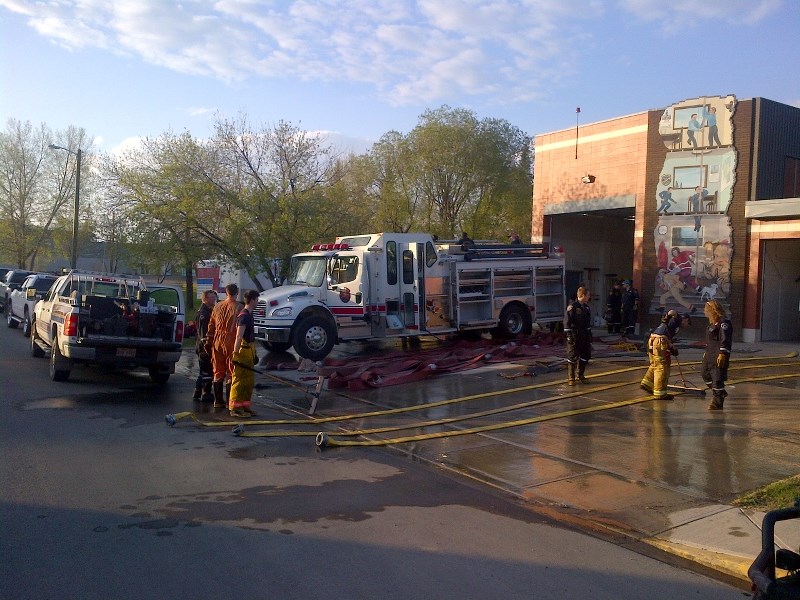Cold Lake RCMP and Fire-Rescue members have returned home safe and sound from the Fort McMurray wildfires.
As the fires move further away from the city, the five Cold Lake RCMP officers and 15 firefighters that volunteered at the height of the fire crisis returned this week.
“It was definitely a different experience,” said Deputy Chief of Operations for Cold Lake Fire-Rescue Hugh McKay, one of the firefighters who went to Fort McMurray. “From the municipal fire perspective, (going from) fighting a house fire (here) to up there (was a lot different). It was a report of a structure fire, suddenly it was two after a few minutes, then it's four, then it's six. It was a massive scale, I don't think it was what anyone had prepared for.”
McKay left around supper time on Wednesday night, as a member of the second crew and pumper truck that was sent as the fires escalated.
“We made the trip up Hwy. 63, because Hwy. 881 was closed due to the fatal collision. As we got closer we tried to get mentally prepared, there was still little fires in the ditches and smoke across the horizon,” said McKay.
The crew drove through a kilometre of solid smoke to get to the Fort McMurray staging area, where available resources waited for instructions. There were two staging areas in Fort McMurray. One had a northern focus and the other had a southern focus on either side of the Athabasca River.
The firefighters worked from the time of their arrival to 11 a.m. the next day fighting hot spots.
“We went back to staging to rehab for a few hours and then we were back at it,” said McKay.
He added, “With everything happening it's hard to sleep. At that point there wasn't a lot of places to sleep. Our guys were sleeping in trucks and on ball diamonds. We got about three hours sleep in the first 60 hours.”
Many firefighters in northern Alberta, volunteer or dull-time, have wildfire training due to the volatility of the area for fires. That meant that all of the different divisions that answered the call to Fort McMurray could work cohesively as a unit.
“People say the fire-hood is a brotherhood, that's true. Everyone got along, we really understood there was a job to be done and we got it done. It was seamless,” said McKay. “They talk about heroes and all that stuff, for me that doesn't matter. We had 60 guys ready and waiting to go. We also had some stick around for what needs to be done in our own communities, and I honour and respect them as well.”
When asked why he volunteered, McKay related it was the right thing to do.
“I volunteered just like everyone else because there was someone in need and the service is based on service to others,” said McKay.
Sgt. Troy Hadland of Cold Lake RCMP also made the trip to aid Fort McMurray. He worked to sustain his colleagues, making sure they were well cared for while working as escorts or at checkpoints.
“I was up there on an employee assistance capacity, making sure our members were being looked after,” said Hadland. “If they needed medical care or contact information. For example, some guys went down with some sort of flu bug. We made arrangements to get those guys out of there.”
Hadland said out-of-city emergency services crews backed up Fort McMurray services.
“Everyone that was up there was happy to help out, and give the Fort McMurray RCMP a break from up there. They were all relieved and given some time off. It goes without saying they were very emotionally involved and physically tired,” said Hadland.
The province is now drawing resources from other detachments, from as far as British Columbia and Saskatchewan. Hadland said the reason other detachments are being contacted is to give Alberta resources a break.
Hadland suspects the Cold Lake RCMP will be called in the coming weeks to return to Fort McMurray.
McKay said Cold Lake Fire Rescue will answer the call if needed. He suggested Fort McMurray, however may be out of the woods now that the fires have moved past the city.
“By the time we left it was pretty much back out into the forest, there wasn't active invasion into inhabited areas. We're moving on into the mediation and recovery phase.”



